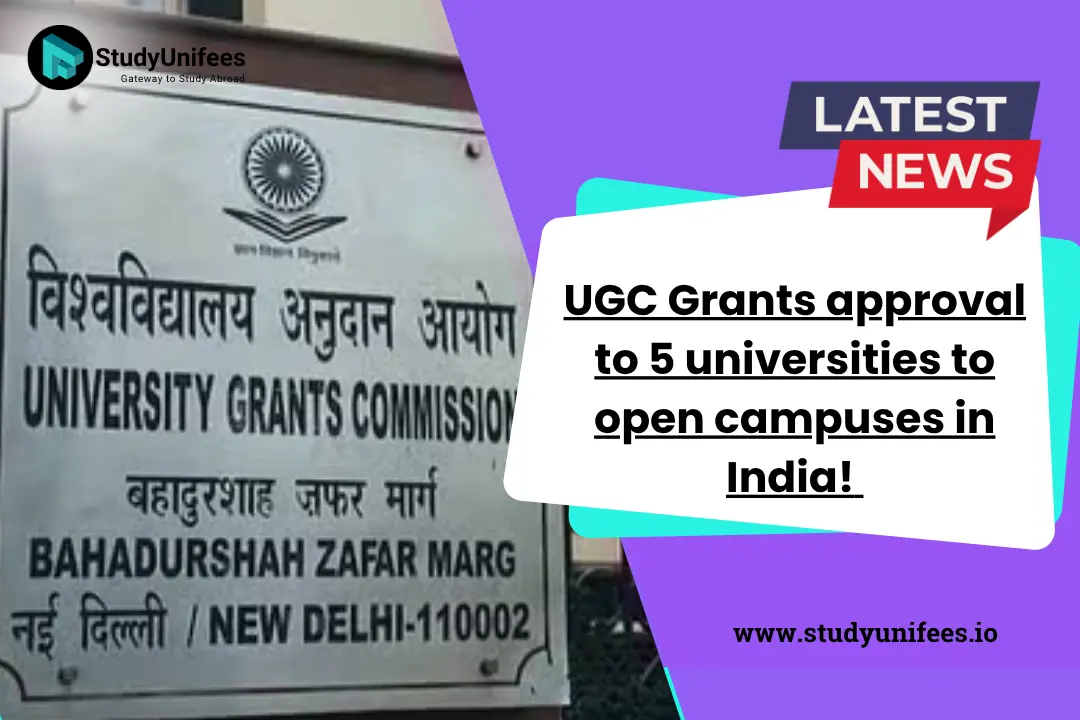UGC Grants approval to 5 universities to open campuses in India!

UGC Grants approval to 5 universities to open campuses in India!
Victoria University (VU) and Western Sydney University (WSU), Illinois Institute of Technology (Chicago), Istituto Europeo di Design (Italy) and The University of Liverpool (UK) get approval to set up campuses.
Australia is poised to significantly expand its academic presence in India, capitalizing on a renewed global enthusiasm for the complex venture of transnational education through branch campuses.
The University Grants Commission (UGC) of India has recently approved applications from five international institutions to establish satellite campuses, including two Australian universities: Victoria University (VU) and Western Sydney University (WSU). Joining them are the Illinois Institute of Technology from Chicago, Italy’s Istituto Europeo di Design based in Milan, and the University of Liverpool from the UK.
This wave of approvals underscores India’s emergence as a focal point for a revitalized push by universities from Australia, the UK, and the US to establish overseas academic hubs. Last July, Deakin University and the University of Wollongong pioneered this trend by launching campuses in Gujarat’s Gift City, a special economic zone, followed by the University of Southampton, which began operations on Delhi’s periphery in August.
The University of Western Australia has also submitted an application to the UGC for permission to establish campuses in Mumbai and other Indian locales. Vice-chancellor Amit Chakma described the initiative as a “new chapter in our century-long illustrious journey.”
WSU, which announced its intent to establish an Indian campus in January after opening a branch in Surabaya, Indonesia, the previous September, plans to commence operations in early 2026. The Delhi campus, situated in an industrial hub on the city’s interstate outskirts, will offer programs in agriculture, food security, computer science, business, and engineering. A WSU spokesperson expressed enthusiasm, stating, “This is a significant milestone in our journey to establishing a presence in Greater Noida, Uttar Pradesh. The university continues with its planning towards establishing a campus which includes seeking approval by our board of trustees.”
VU has been less forthcoming about its plans but anticipates receiving a “letter of intent” from the UGC, according to senior deputy vice-chancellor John Germov. He noted, “[We are] looking forward to working alongside local partners to…create a thriving campus for students and collaborate on ways to make a tangible contribution to India’s National Education Policy.”
As universities in Australia, the UK, and North America face increasing restrictions on recruiting international students to their home campuses, offshore ventures appear as a viable alternative. However, experts caution against expecting swift financial returns. Justin Bokor, an independent adviser with prior roles at Monash University and EY, warned, “Branch campuses don’t deliver…a financial boon in the first three to five years, [and] frequently not in the first five to 10 years.”
Financial reports corroborate this view. Monash University’s campuses in Malaysia, China, and Indonesia contributed only 4.3 percent of its revenue last year, with the long-established Malaysia campus, operational for 27 years, accounting for nearly all of it. The newer China and Indonesia campuses, launched in 2012 and 2020, respectively, each generated a mere 0.2 percent of total income.
Similarly, the University of Wollongong’s Dubai campus, established over three decades ago, contributed 7 percent of institutional revenue in 2023, while its six-year-old Malaysia campus added 3 percent. However, its Hong Kong campus, plagued by declining enrollments and underutilized facilities, posted a A$53 million (£25 million) deficit. Despite financial strains necessitating approximately 275 job cuts, Wollongong is advancing plans for a pioneering campus in Saudi Arabia. New Zealand’s Massey University is similarly expanding in Singapore while implementing domestic staff reductions.
WSU, which announced up to 400 job cuts in April due to ongoing deficits, faces challenges in replicating the favorable conditions enjoyed by Wollongong and Deakin in Gift City, where tax-free profit repatriation is permitted for a decade. Alastair Dawson, a business consultant and former vice-president at Central Queensland University, highlighted the financial complexities of offshore campuses, noting, “There’s a lot of hidden costs that you don’t really ever understand until you get there.” Dawson, who established CQU’s Jakarta campus and explored further expansions in Sumatra and Sulawesi, emphasized that international students in Australia are often motivated by access to its lucrative job market—a draw absent in offshore campuses. He added, “You’ve got to tap into the scholarship market…but it’s a lot more work, and it’s a lot less profitable.”
Nevertheless, Bokor sees offshore campuses as a “pathway to vibrancy” amid stagnant domestic enrollments and stringent government restrictions on international student recruitment. He highlighted India’s vast demographic potential, with approximately 120 million people aged 20 to 25 and a government goal to double tertiary education participation. “Even without any population growth, that will supply a vast number of young people to be educated – and that’s just India,” he said. “If you can’t access that onshore, and they have a need for extra supply offshore, then go to where the market is. If you can get that right, then it becomes a source of strength and vitality for your organisation over the next generation.”
